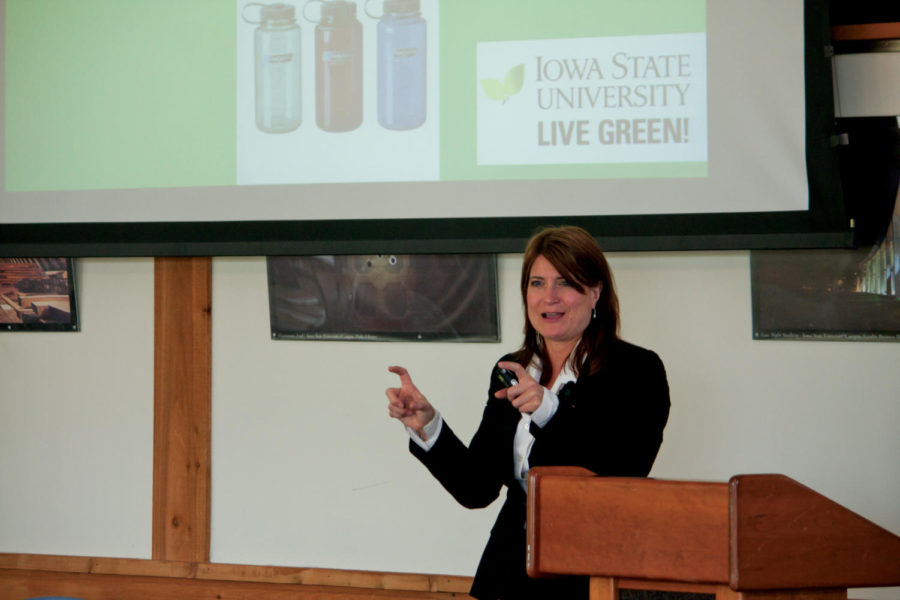How to live more sustainably in new year
Photo: Nick Nelson/Iowa State Daily
Merry Rankin, ISU director for sustainability, talks at Reiman Gardens during a green bag lunch about ways you can be sustainable and resources available. Rankin spoke to participants over a green bag lunch encouraging the use of reusable products.
January 11, 2017
A morning cup of coffee or a trip to the grocery store: The decisions individuals make surrounding these simple routines are the ones that can affect our environment the most.
Americans produce, on average, 220 million tons of waste a year, filling up space in one of the approximately 3,500 landfills in the nation, according to Duke University’s Center for Sustainability and Commerce website.
With an increase in product demand that is rising with the nation’s population growth and an increasing standard of living, excessive consumer habits surrounding what people buy and how they discard their used products are being recognized as controllable eliminators of product and energy resources.
“Say that a student gets three to five paper cups of coffee a week,” Merry Rankin, director of sustainability at Iowa State, said. “Over time, that pile of coffee cups really grows. One cup of coffee can suddenly become a choice with a collective impact.”
Rankin advocates strongly that individuals think about what they are throwing away and what time energy and land resources are being put into waste management systems before they dispose of used products.
“I think that sustainable living is making a decision not just upon our current needs, but in thought of future generations,” Rankin said. “If we consider generations before us, with what we enjoy now and have available, there are individuals and organizations that have given that same thought.”
Some ways in which Rankin believes individuals can honor past generations and their conservation are through actions following the three Rs of sustainability: reducing consumption of unnecessary products, reusing products when able and recycling products that can be used again.
“Reusable coffee mugs instead of paper, bringing your own bags instead of using plastic at the store, cloth napkins instead of paper, taking items that may otherwise be considered waste items and creating different and unique uses for them are all ways in which people can live more sustainable lives,” Rankin said.
Swapping products online, donating them and selling items in consignment shops are various other ways Rankin recommends repurposing old items.
Megan Koppenhafer, president of The Green Umbrella, a sustainability club at Iowa State, shares Rankin’s belief in the importance of making the most of, and not wasting thoughtlessly, the products and resources people already have in order to preserve opportunities for the future.
“College is a great time to start living more sustainably,” Koppenhafer said. “We are starting to realize our energy bills and trash accumulation, as we are starting to take care of ourselves.”
Through her experience working in her community as an advocate for the reduction of waste creation, Koppenhafer has observed a variety of benefits in reusing products and reducing product consumption.
“Taking shorter showers and shutting off water … five minutes in a shower can save a good deal of water,” Koppenhafer said. “Shutting off lights when you go from room to room … anything you do to save energy, to conserve water, hits economic as well as environmental sustainability.”
Rankin and Koppenhafer acknowledged a parallel of less stress in communities and an increase in social and economic stability in the community for those who interact sustainably.
One positive effect of sustainable living that Rankin recognized has to do with the effects of buying food locally.
“[People] help strengthen and support local communities, giving back to our communities, when they buy locally,” Rankin said. “The decisions people make every day, like product purchase, sends a message. We like your product and we like your methods.”
Rankin and Koppenhafer both strongly believe that, in this new year, more individuals should begin living in a more sustainable manner that gives future generations a chance to have the same resource opportunities that are available to them today.
“I don’t think any act is too small. Collectively [they make] such a difference,” Rankin said. “It is important for people to find those things that resonate with them. You don’t have to give up driving your car. Start with making a change that works for you and find ways to make additions.”
















